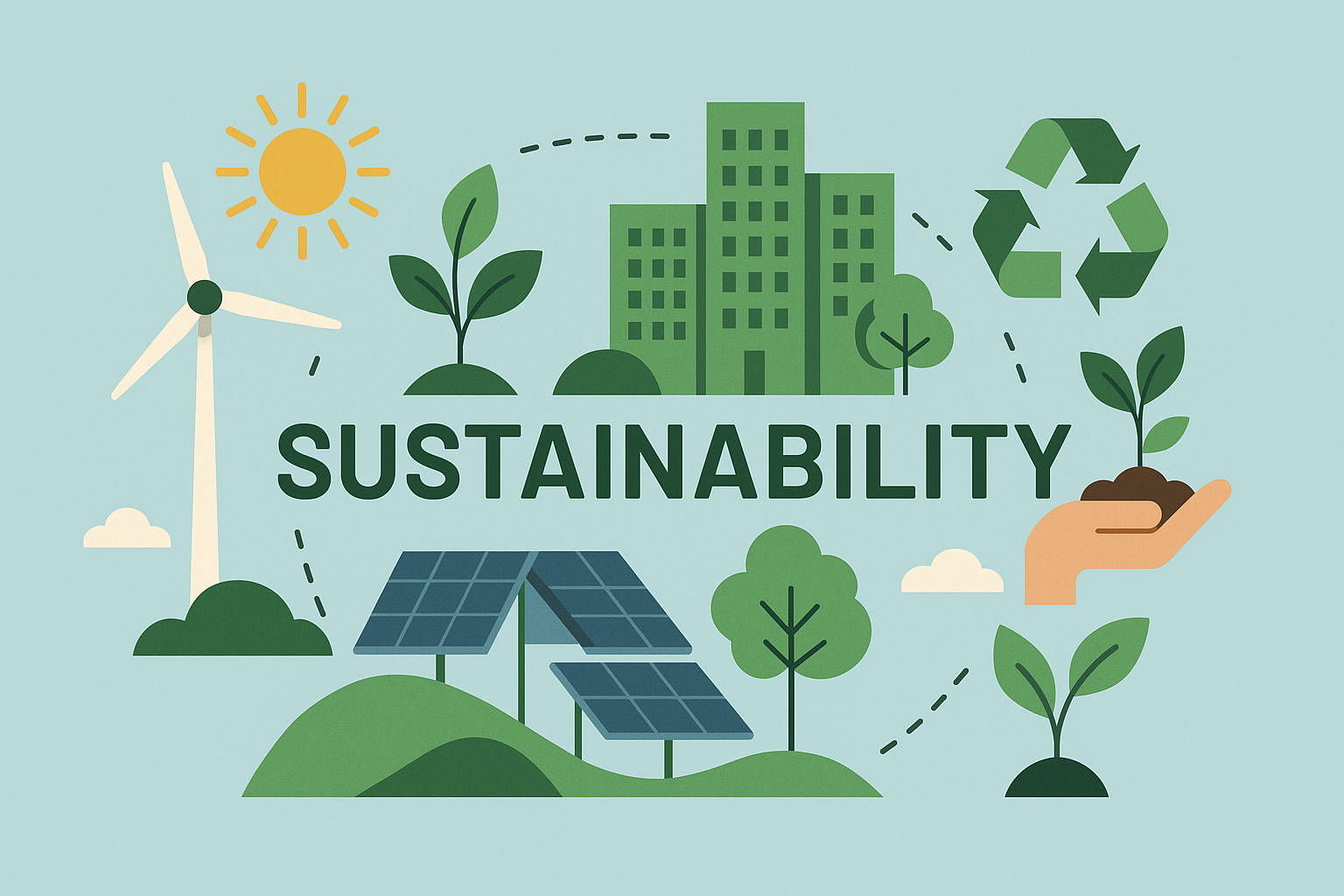Sustainability in construction: Knowledge hub
Contents |
Summary
Sustainability is a central challenge and opportunity for the construction industry. It encompasses the environmental, social and economic impacts of buildings and infrastructure across their entire lifecycle, through planning, design, construction, operation and eventual demolition or reuse.
This knowledge hub brings together key guidance, definitions, legislation, and innovations relating to sustainable construction. Whether you're an architect, engineer, project manager or student, this is your starting point for understanding and applying sustainable practices.
What is sustainability in construction?
Sustainability in the built environment means creating built assets that meet the needs of the present without compromising the ability of future generations to meet their own needs. It includes:
- Reducing carbon emissions through energy-efficient design, low-carbon materials and modern construction methods.
- Managing resources efficiently and ethically, including people, water, energy, waste and raw materials.
- Enhancing biodiversity and ecological value.
- Improving wellbeing and health.
- Promoting long-term economic value through lifecycle assessment and resilient construction.
Why does sustainability matter in construction?
The UK construction sector is responsible for around 40% of the nation’s carbon emissions. Transforming the way we plan, design, build, operate and decommission buildings is essential to achieving net-zero goals, complying with regulations, and creating healthier, more resilient places.
Key articles about sustainability
Here are some of the most important and widely read articles about sustainability on Designing Buildings:
- What is sustainability in construction? Key principles and practices aimed at reducing environmental harm.
- Approved document L. Conservation of fuel and power.
- Biodiversity. The variety of life in the world or in a particular habitat or ecosystem.
- Biophilic design. Connecting people to nature and natural processes
- BREEAM. Best practice standards for the environmental performance of buildings
- Carbon. A shorthand for carbon dioxide, the most important greenhouse gas released by humans.
- Circular economy. Designing out waste and keeping products in use.
- Climate change. What it is and how it is caused.
- Climate Change Act. the first time a country introduced a legally binding framework for tackling climate change.
- Display Energy Certificate. In-use energy ratings for public buildings.
- Ecology. How ecological principles inform sustainable practices.
- Embodied carbon. Measuring the hidden carbon cost of materials and construction processes.
- Embodied energy. Measuring the hidden energy cost of materials and construction processes.
- Energy efficiency. Techniques and standards for reducing energy use.
- Energy performance certificates. Rating building energy efficiency for construction, sale, or rent.
- Energy related products regulations. Setting minimum energy efficiency standards.
- Greenhouse gases. Causing heat to accumulate in the atmosphere
- Green infrastructure. Integrating nature-based solutions into the built environment.
- Green rating systems. Overview of BREEAM, LEED, Passivhaus and other rating systems.
- Kyoto protocol. An international agreement on greenhouse gas emissions.
- Life cycle assessment. Understanding and measuring impacts throughout a building’s life.
- Minimum Energy Efficiency Standard (MEES). Setting minimum standards for the UK’s older building stock.
- Montreal protocol. Protecting the ozone layer - a world first environmental agreement.
- Net zero 2050. A summary of the policy position, and progress towards the goal.
- Ozone depleting substances. Essential ozone is destroyed by chlorine and bromine atoms.
- Passivhaus. An energy performance standard for dwellings, commercial, industrial and public buildings.
- Protected species. Legally safeguarded animals or plants requiring special consideration in development.
- Recycling. Converting a waste material into a material that can be used again.
- Sustainable building materials. Guidance on selecting materials with low environmental impact.
- Sustainable development. Meeting the needs of the present without compromising future generations.
- Sustainable procurement. Achieving value for money on a whole life basis.
- Sustainability in facilities management. Avoiding the depletion of natural resources to maintain an ecological balance.
- Wellbeing. Definition, contributing factors and links to more guidance.
- Whole life carbon. Accounting for carbon associated with materials, from cradle to grave.
All articles about sustainability
There are more than 2,000 articles about sustainability on Designing Buildings. A full index is available here.
You can access our other subject-specific knowledge hubs here.
Stay up-to-date
This hub will be updated regularly with new guidance, policy changes, and innovations. Bookmark this page or subscribe to our newsletter to stay informed.
This web page is openly licensed via CC BY 4.0.
Featured articles and news
A case study and a warning to would-be developers
Creating four dwellings... after half a century of doing this job, why, oh why, is it so difficult?
Reform of the fire engineering profession
Fire Engineers Advisory Panel: Authoritative Statement, reactions and next steps.
Restoration and renewal of the Palace of Westminster
A complex project of cultural significance from full decant to EMI, opportunities and a potential a way forward.
Apprenticeships and the responsibility we share
Perspectives from the CIOB President as National Apprentice Week comes to a close.
The first line of defence against rain, wind and snow.
Building Safety recap January, 2026
What we missed at the end of last year, and at the start of this...
National Apprenticeship Week 2026, 9-15 Feb
Shining a light on the positive impacts for businesses, their apprentices and the wider economy alike.
Applications and benefits of acoustic flooring
From commercial to retail.
From solid to sprung and ribbed to raised.
Strengthening industry collaboration in Hong Kong
Hong Kong Institute of Construction and The Chartered Institute of Building sign Memorandum of Understanding.
A detailed description from the experts at Cornish Lime.
IHBC planning for growth with corporate plan development
Grow with the Institute by volunteering and CP25 consultation.
Connecting ambition and action for designers and specifiers.
Electrical skills gap deepens as apprenticeship starts fall despite surging demand says ECA.
Built environment bodies deepen joint action on EDI
B.E.Inclusive initiative agree next phase of joint equity, diversity and inclusion (EDI) action plan.
Recognising culture as key to sustainable economic growth
Creative UK Provocation paper: Culture as Growth Infrastructure.






















